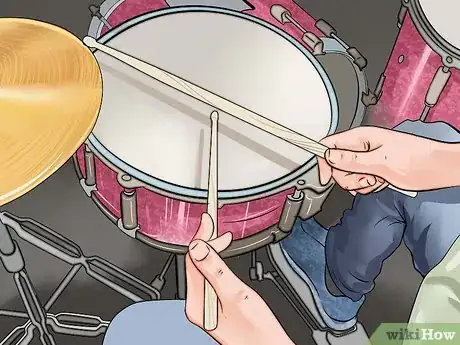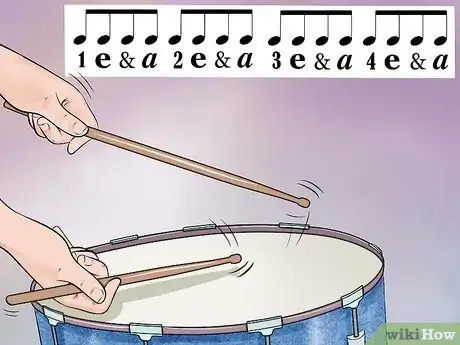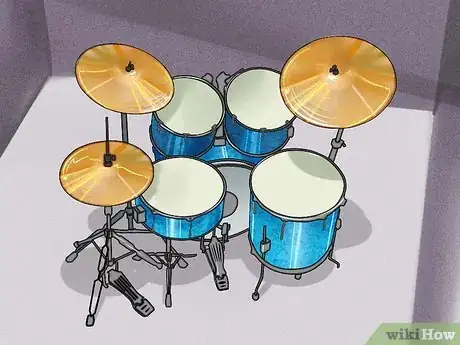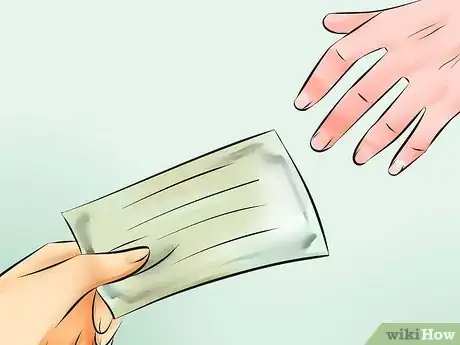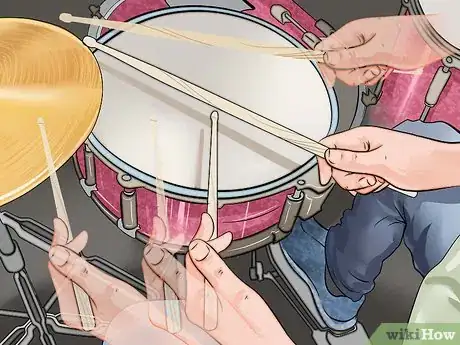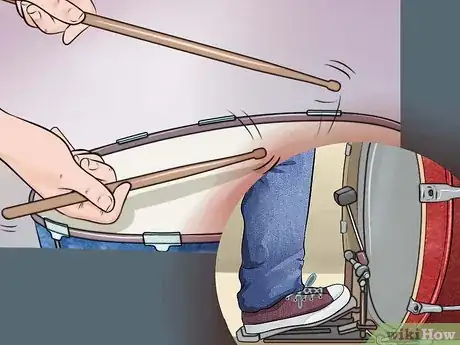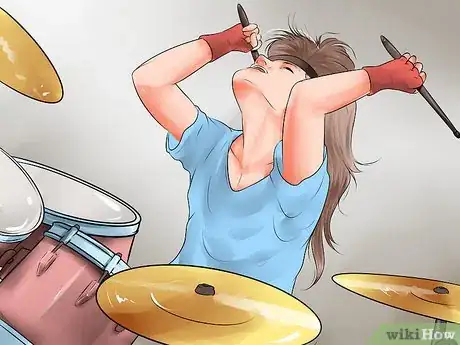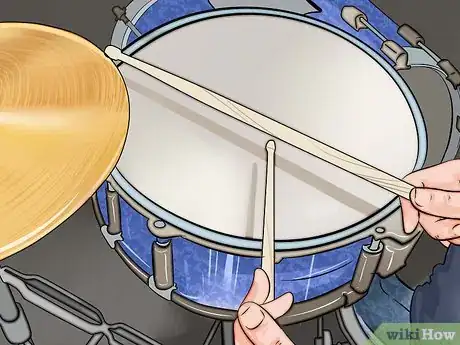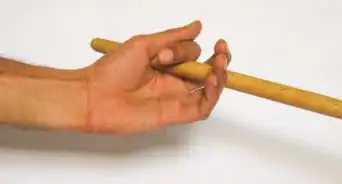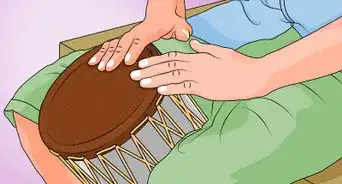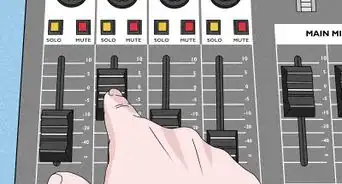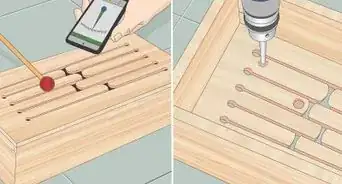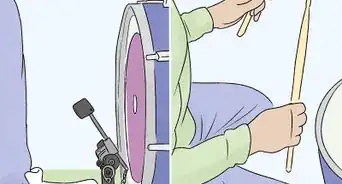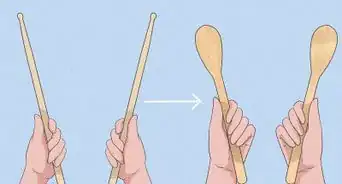wikiHow is a “wiki,” similar to Wikipedia, which means that many of our articles are co-written by multiple authors. To create this article, 60 people, some anonymous, worked to edit and improve it over time.
This article has been viewed 225,853 times.
Learn more...
Do you want to learn to play the drums like a pro? You've got to start with a mindset that you want to be the best. You must decide to be totally dedicated and prepare yourself to do whatever it takes. Keep reading for instructions on playing drums like you were born to do it.
Steps
Working Hard
-
1Practice! If you don't practice then you'll never be good. It takes a lot of hard work.
-
2Take drum lessons. Many drummers will tell you that they are self-taught. This leads some drummers to think that lessons are not necessary and they'll often avoid it altogether. We're here to tell you that, without a firm foundation, you could pick up some real bad habits that may take you years to "unlearn". Find a reputable, qualified teacher and study the foundation of drumming before you do anything else. Make sure you know how to read music and that you know the different styles of drumming.Advertisement
-
3Have the best gear. Remember that a drum kit is as good as the person playing it. A fantastic drum kit tuned and played by a beginner will sound awful, whereas a cheap no name drum kit that is tuned and played by a seasoned drummer can actually sound wonderful. That being said, sturdy hardware is no unnecessary luxury. Get a drum throne that suits your height and supports your weight, and that you can keep proper balance on. Make sure your pedals rum smoothly. And last but not least, make sure your drums and cymbals are stable on their stands.
-
4Market yourself. There is an old saying; "Out of Sight, Out of Mind" and it is one of the truest things ever written. You can be one of the best but if no one sees you play, you can't possibly get hired. Learn marketing techniques and get out in front. Make sure everyone in town knows who you are. Sit in on jam sessions and hand out business cards. Leave no stone unturned.
-
5Follow the "no pain, no gain," mantra. One thing weightlifters understand is that progress in building a muscle really starts when you push past that point where you want to quit. The same goes for drumming too. If you'll really dedicate yourself and practice diligently, you will see a remarkable difference in your playing. Go the extra mile and don't settle for mediocrity.
-
6Be professional. Warm up before every gig, play for the music (not for yourself), be on time, and act professionally. Your reputation will determine how much you work. If you don't take yourself seriously, other musicians won't take you seriously.
-
7Play with other musicians at every opportunity. You will learn much more playing in bands than practicing in your bedroom. Never turn down a gig and always be willing to play unfamiliar styles of music.
-
8Develop your own style. You won't know what your style is if you only copy beats, and once you join a band you can't copy beats for your own music. Never double book yourself and if you really have to cancel a gig, make sure you recommend a reliable dep to fill in.
Playing with More Experienced Musicians
-
1Push yourself to perform with more experienced musicians, even if it's for a rehearsal or a jam session. Don't be afraid; this kind of practice will take your game up to the next level. Of course, they shouldn't be way more experienced than you or it'll lead to some awkwardness. But if you can hold your own in a jam session with them while learning something, then go for it.
-
2Be keen and listen to what the bandleader says. Don't be stubborn about how awesome you are. Take his advice instead. Listen to what you can really take away and use to improve your playing.
-
3If the bandleader says you are too loud or need to calm down, don't take it too personally. He's probably right. He's just trying to get you up to speed with everyone else. Remember that you want to learn to work together with other band members, even if it means you have to adjust your style a bit.
-
4Be aware of your surroundings. Be sensitive to the environment you are playing in, if it's a small room you need to adapt or play quieter, in a large venue you may need to play a bit louder.
-
5Master the dynamics. Set yourself at least 10 different volumes of playing. You can say to your bandleader would you like 1 - 10.
Community Q&A
-
QuestionHow can I improve my kick drum playing?
 Ajogwu Edache ChristopherCommunity AnswerPractice different strokes (groups of 2, 3,or 4, strokes) from a slow tempo that you are comfortable with and gradually progress into faster tempos.
Ajogwu Edache ChristopherCommunity AnswerPractice different strokes (groups of 2, 3,or 4, strokes) from a slow tempo that you are comfortable with and gradually progress into faster tempos. -
QuestionHow do I play the drums for different genres?
 Community AnswerListen to the different genres you want to play. Find a few songs in each style, transcribe the original part and learn to play it with the touch/feel/dynamic used. Pick songs that use a variety of common beats in that style; e.g. for county, find a song with a train beat, a country shuffle, and a straight ahead pop/country song. Once you're comfortable with those, find other songs with those beats at various tempos, volumes, and feel.
Community AnswerListen to the different genres you want to play. Find a few songs in each style, transcribe the original part and learn to play it with the touch/feel/dynamic used. Pick songs that use a variety of common beats in that style; e.g. for county, find a song with a train beat, a country shuffle, and a straight ahead pop/country song. Once you're comfortable with those, find other songs with those beats at various tempos, volumes, and feel. -
QuestionHow can I improve my stage presence?
 Community AnswerMake eye contact; don't stare at the ground or your instrument constantly.
Community AnswerMake eye contact; don't stare at the ground or your instrument constantly.
Warnings
- Be nice to your ears!! The drum kit can produce volume levels of 100-120 dB. Wear earplugs when you practice and perform. You only have your hearing once...⧼thumbs_response⧽
- PRACTICE PROPER TECHNIQUE! If you don't play with proper technique you will soon be faced with problems such as arthritis and strained wrists. As long as you use proper technique you can play 4 hours a day until you're 60 years old and have no physical strain caused by drumming!⧼thumbs_response⧽
Things You'll Need
- A drum set
- Drum sticks
References
- Learn To Play Drums
- A Guide to Rock Drum Lessons
- Learn How To Play Drum Rudiments
- How To Play Drums - Guide to playing drums
- Drum Lessons Complete Beginner to advanced drum lessons.
About This Article
To play drums like a pro, you need to practice diligently on your own. While drum lessons don’t undo the need for practice, they can help establish a solid foundation of good habits early on. Most importantly, get out and play with as many other musicians as possible, particularly if they’re more experienced than you. In a band setting, always listen intently to your bandleader’s directions, and don’t take it too personally if they ask you to quiet down! Scroll down for tips on how to market yourself and develop your own style!
